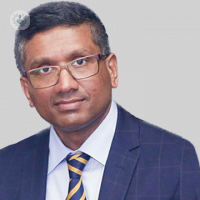Haemorrhoids: an expert's guide
Written by:Haemorrhoids are a condition which can cause severe pain, having a major impact on daily life. We speak to consultant surgeon Mr Vijitha Chandima Halahakoon who discusses the condition, including symptoms, risk factors and treatment options.

What are haemorrhoids?
Haemorrhoids are vascular cushions in the lower rectum. Haemorrhoidal cushions also have a physiological function; they maintain continence against liquid stools and air. Having haemorrhoidal cushions is entirely normal and physiological, but sometimes they can give rise to symptoms.
What are the common symptoms and signs of haemorrhoids?
Haemorrhoid symptoms arise when someone is constipated. Hard stools push them down to anal canal and protrude them outside the anus, (felt as lumps) and cause damage to the lining mucosa, which leads to bright red blood in the stools.
Sometimes the lining layer of the haemorrhoids can produce excess mucus that can lead to slimy discharges through the anus and itching around the anus. In rare cases, the blood vessels inside the haemorrhoids can clot (thrombose) or strangulate, leading to pain.
What are the different types of haemorrhoids, and how are they identified?
Broadly speaking, haemorrhoids can be both internal and external. They are categorised as grades 1 to 4 in relation to where they are in the anal canal, and whether they have caused any complications.
What are the potential causes and risk factors associated with developing haemorrhoids?
Constipation is the most common risk factor for developing haemorrhoids, and although uncommon, someone may be susceptible to haemorrhoids due to family history/genetics. It is also common for pregnant women to suffer from haemorrhoids. However, the issue tends to settle once after the delivery.
How can haemorrhoids be treated, and what are the available treatment options?
Often haemorrhoids are treated conservatively. Drinking plenty of water and eating lots of fibre will keep the bowel motions soft. Over-the-counter laxatives will help with constipation when conservative measure fails.
Prolapsing haemorrhoids can be returned with gentle pressure from the fingers. If the haemorrhoids are painful, regular painkillers and a warm bath will help. A warm bath and an ice pack will help with pain and discomfort. Over-the-counter haemorrhoidal creams will help to shrink the haemorrhoids and will give a soothing effect as well.
When haemorrhoids are persistent or when they recur other treatment options should be considered. Options depend on the grade of haemorrhoids and their positions. Grade 2 and 3 haemorrhoids can be treated with banding or injections in a clinic room. However, when they are grade 3+, often an operative intervention named haemorrhoidectomy is required. This can be performed as a traditional open haemorrhoidectomy or a stapled haemorrhoidopexy (when the haemorrhoids are circumferential and prolapsing), or a haemorrhoidal artery ligation technique. These are performed as day cases, under general anaesthesia.
Are there any lifestyle changes or home remedies to alleviate haemorrhoid symptoms?
Avoiding constipation and straining by keeping your bowel motions soft will prevent you from having symptoms from haemorrhoids. The most effective way to achieve this is by drinking a lot of water and having a diet rich in fibre.
If you would like to book a consultation with Mr Halahakoon, do not hesitate to do so by visiting his Top Doctors profile today.


